Joining the military is a big commitment, but comes with a lot of benefits. Healthcare coverage for the service member and their family, an allowance to pay for housing, and financial coverage for all moving expenses, just to name a few. But there are certain specialties within the military that actually pay more than others.
So what are the highest paying military jobs?
The simple fact is, there is no such thing as “the highest paying branch of the military”, or “highest paying military job”. All members of the military, regardless of whether they’re in the Army, Navy, Air Force, or Marines, are paid based on their rank and time in the service.
It doesn’t matter if you’re a Navy SEAL or a cook…if you’re an E-4 in the Navy, you’ll be paid the same no matter what your job is.
With that said, there are a few creative ways you can maximize the financial benefits of joining the military.
It all starts with the job that you choose. Let’s jump right in and find out how you can land the highest paying jobs the military has to offer.
Jump To A Section
How Much Do Military Members Get Paid?
Jobs In The Military
Army Military Occupational Specialty (MOS)
Air Force Specialty Codes (AFSC)
4 Bonuses You Can Get When Signing Up
How much do military members get paid?
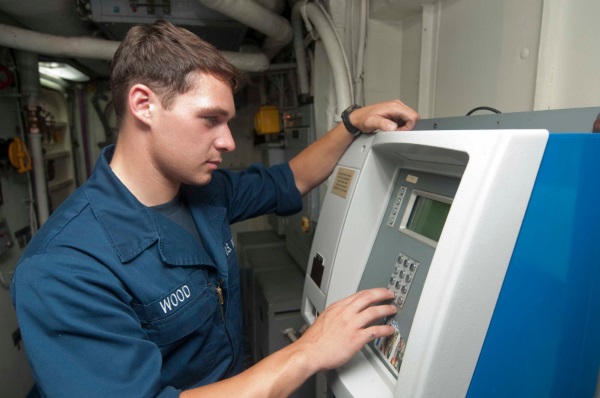
As I mentioned earlier, all members of the military are paid based on their rank and time in service.
It doesn’t matter if you’re in the Navy, Army, Air Force, Marine Corps, or Coast Guard.
This basic pay is set as part of the annual Defense budget by Congress and is “typically the largest component of a member’s pay,” according to the Department of Defense.
Every year, Congress authorizes a pay raise for the military based on the Employment Cost Index determined by the Department of Labor that takes inflation and an overall raise in private-sector pay into account.
Military members are also provided with a basic allowance for housing (BAH) and basic allowance for subsistence (BAS).
It’s important to note that, unlike basic pay, the amount you’ll receive from BAH and BAS will vary considerably depending on where you’re stationed.
Check out our BAH calculator here.
These allowances are not considered pay and are not taxed. Enlisted members are also given periodic clothing allowances to replace and maintain military clothing and uniforms.
Other allowances include family separation allowance (FSA) in certain circumstances and dislocation allowance (DLA).
BAH and BAS are given to all service members based on their rank, location, and number of dependent family members.
Other allowances are often situation dependent, such as given when a service member relocates or is away from their family for more than 30 days.
Specialties in the military
The military is organized through a clear rank structure, beginning with E-1 and progressing all the way to O-10 in seniority.
When joining the military, new service members elect to enlist (E-1 through E-10) or get commissioned as an officer (O-1 through O-10).
As you might expect, officers are paid much more than enlisted personnel.
There are programs that provide a path for enlisted members to become officers, based on their performance and leadership potential.
Each member of the military is also identified by their specific skills and training.
Each service uses their own terms but all refer to the job or specialty that an individual service member performs in their primary duties.
Army Military Occupational Specialty (MOS)
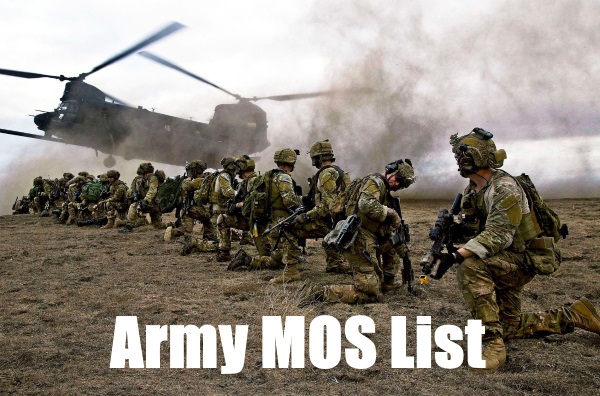
Note: See a full list of Army MOS’ here.
When a member of the Army tells you their MOS, which stands for Military Occupational Specialty, they are telling you what job they perform for the Army.
MOS codes are identified in a service member’s official record so that they are eligible for assignments that use their skills.
Some MOS codes are specific to enlisted or officers, while others can apply to either.
Example MOS codes include:
-
- Ammunition Specialist (89B)- Enlisted
- Interpreter (09L)
- Infantry Officer (11A)- Officer; Infantryman (11B)- Enlisted
- Combat Engineer (12B)- Enlisted
Click Here to see the 10 Best Army jobs for civilian life.
Navy Ratings

Note: See a full list of Navy ratings here.
Enlisted members of the Navy are identified by their rating, while Officers are identified by their community.
Officers are also identified by a 4 number designator code. This shows if they are an unrestricted line officer, restricted line officer, staff corps officer, or limited duty officer.
Related Article: Navy Ranks And Pay For 2019
This further identifies what types of roles and responsibilities they will hold while serving.
Navy Classification Codes (NEC) provide further identification of schools and training that service members have completed within their field and are including in their official record.
Example ratings and designators include:
Click Here to see the 10 Best Navy Jobs For Civilian Life.
Air Force Specialty Codes (AFSC)
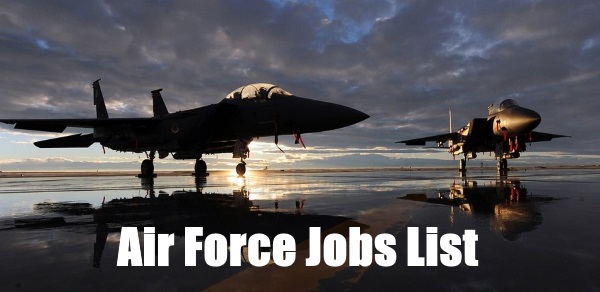
Note: See a complete list of Air Force AFSC’s here.
The Air Force organizes both enlisted and officer specialties using Air Force Speciality Codes (AFSC).
Each service member’s job skills are identified by a 4- or 5-digit code of letters and numbers.
The Air Force is unique in including the amount of experience or skill that an individual has in their code.
A new recruit who has only completed the most basic amount of training within a specialty may remain at the level of a Helper or Apprentice.
Those with more experience can move up to the Journeyman or Craftsman level.
This is separate from their actual military rank.
Letter prefixes or suffixes may also be added to indicate specialized training, such as on a particular aircraft.
Example AFSCs include:
Click Here to see the best Air Force jobs for civilian life.
Marine Corps MOS
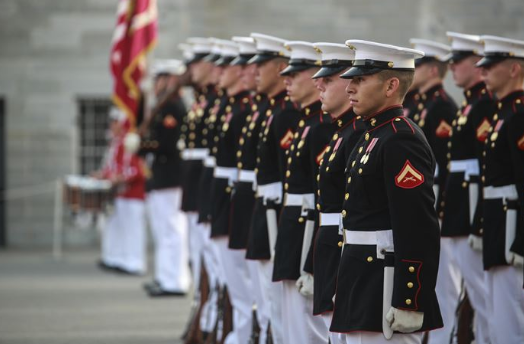
Note: See a complete list of Marine Corps MOS’ here.
The Marine Corps uses the same skill identification structure as the Army with their own specialties.
Every Marine is identified by their MOS.
The first 2 numbers identify the career field while the last 2 numbers identify the actual job.
Example MOS codes in the Marine Corps include:
Click Here to see the 10 best Marine Corps jobs for civilian life.
Coast Guard Ratings

Note: See a complete list of Coast Guard ratings here.
The Coast Guard uses the Navy organization system of ratings for enlisted service members.
Many of the same ratings are used in the Coast Guard and the Navy. Officers train within their specialty and subspecialty fields.
Examples ratings and specialties include:
-
- Boatswain’s Mate (BM)- Enlisted
- Electronics Technician (ET)- Enlisted
- Rescue Swimmer (AST)
- Response-Afloat specialty/Ship based Law Enforcement and Homeland Security subspecialty- Officer
Click Here to see the 5 best Coast Guard jobs.
Can I change jobs once I’m already serving in the military?
Military members do have the option to change specialty within their career, but the process can be long and require a lot of paperwork.
Sometimes the military is unable to let military members choose a new skill, either because the training resources are not available or they need the skillset that the member already has.
It is important to understand and choose a specialty that interests you from the beginning.
Related Article – How to Join the US Military as a Non-Citizen
Bonuses When Entering Service
The best time to stop to think about long-term earnings potential and bonuses is when you first join the military.
“Choose your rate, choose your fate” is a saying often heard from seasoned military veterans—for good reason.
Choosing your specialty has a big impact on everything from your work environment and operational schedule to the opportunities for additional pay incentives.
When entering service, the military has a few programs that provide financial incentives.
Quick ship or Shipping bonus
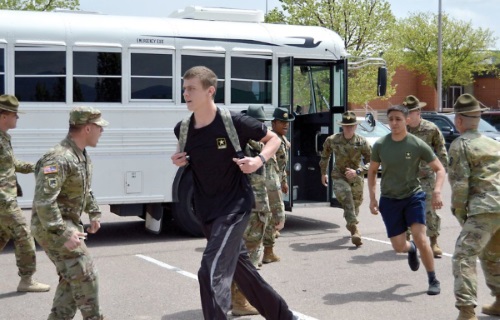
The military wants new recruits to get to training as quickly as possible.
For this reason, the Army offers a quick ship/seasonal bonus to those who sign up to attend basic training within 60 days of enlisting.
For those who ship out within 30 days, the bonus is even higher.
The Navy, for example, offers shipping bonuses to those who leave for boot camp during high-need times.
Critical skill bonus
All services have certain specialties that they need to fill in order to do their mission.
The needs of the service change over time, often based on what skills are in demand in both the military and civilian sectors.
To fill these critical needs, services offer critical skill bonuses.
These critical skills often require advanced training and commitment, so those interested should make sure that they are up to the challenge and additional years of service.
Foreign language bonus
Those with language skills in certain areas may be eligible for a bonus if they enlist in an MOS or rating that will use those skills.
Examples include enlisting as a Human Intelligence Collector in the Army or a Linguist in the Navy.
Service members must demonstrate proficiency on a standardized military test.
This bonus may also be available for active duty and reserve service members.
Student loan repayment
While not a bonus that is paid to the new service member, there are circumstances where the military will repay existing student loans with a new enlistment or commissioning.
Career retention bonuses
The military wants to keep its best and brightest stars in service, when the pull of lucrative private-sector jobs may be pulling them in a different direction.
These bonuses are often given at intervals, such as reenlistments or taking additional tours of duty.
Selective reenlistment bonus
SRBs in the Navy are designed to “increase the number of reenlistments in ratings and Navy Classification (NEC) codes having insufficient retention.”
This is based on the needs of the service and may change from year to year.
Other services have similar bonuses available for those agreeing to reenlist with certain skills.
Prior service enlistment bonus
The Army provides financial incentive for veterans returning to service, provided that they enlist in one of the critical-skills needed by the service to complete their overall mission.
They must have left military service while E-4 or below to be eligible for this bonus.
Skill-based bonus
The majority of mid-career bonuses are available to those with certain skillsets that the military needs.
These are usually specialties that the military has invested a lot of time and money in to train individuals; understandably, the military wants them to stay and use that training rather than apply it in the civilian sector.
Mid-career bonuses are often available for aviators, nuclear-trained officers and enlisted, or special warfare operators.
These bonuses usually come with an additional time of service commitment.
Bonuses for the military reserves
Most of the bonuses in the military apply to active duty service members, but there are still opportunities for those serving in the Military Reserves to earn additional pay.
Many of the bonuses (enlistment, critical skills, career retention) available for active duty service members have a similar option for those serving in the Reserves.
A variety of bonuses are available for those agreeing to serve in a critical skill area.
Other bonuses are provided for those who agree to serve part-time or for those who agree to activate soon after joining the reserves.
Because the opportunities in the military Reserves are so varied, it is best to talk to a Reserve recruiter about what you may be eligible for and how to best pursue your path of service.
It is important to note that available bonuses in the military change from year to year, just as the needs of the service change based on the overall mission.
Those interested in joining should talk to their recruiter to get the most up-to-date information on what financial incentives they may be able to pursue.
Current service members should reach out to the career counselors at their command or a trusted mentor in their field to learn more about bonuses they may qualify for within their career.
References:
- https://militarypay.defense.gov/Pay/Basic-Pay/
- https://www.goarmy.com/careers-and-jobs/browse-career-and-job-categories/intelligence-and-combat-support.AR-active.html
- https://www.navy.mil/navydata/ranks/rankrate.html
- https://www.gocoastguard.com/active-duty-careers/enlisted-opportunities/view-job-descriptions
- https://www.uscga.edu/subspecialties/
- https://www.goarmy.com/benefits/money/bonuses-earning-extra-money.html
- https://www.dfas.mil/militarymembers/payentitlements/Pay-Tables/FLPB.html
- https://www.navy.com/bonus
- https://www.public.navy.mil/bupers-npc/career/payandbenefits/N130/Pages/N130D.aspx
- https://www.public.navy.mil/bupers-npc/career/payandbenefits/N130/Pages/N130D.aspx
- Coast Guard Grooming Standards - June 17, 2024
- Attending the Naval Academy Preparatory School - June 17, 2024
- Vet Tix Review: Your Go-To Guide - June 17, 2024
General FAQ
What are the best jobs in the military?
The best military jobs are the ones that not only peak your interest, but also have good job opportunities after completion of your military service.
What's the easiest job in the military?
All jobs in the military have their own unique challenges, and cannot be characterized as 'easy'.
Which military job pays the most?
All members of the military, regardless of their job, are paid according to their rank and length of time in service.
Which branch of the military pays the most?
All branches of the military are paid the same. As previously mentioned, pay is based on rank and length of service.
What are the best military jobs for civilian life?
Some of the more lucrative career opportunities after military service include: Legal operations, Logistics planners, Law enforcement, and Air Traffic Controllers.
Originally posted on April 1, 2019 @ 1:48 am
Affiliate Disclosure: This post may contain affiliate links. If you click and purchase, I may receive a small commission at no extra cost to you. I only recommend products I have personally vetted. Learn more.
